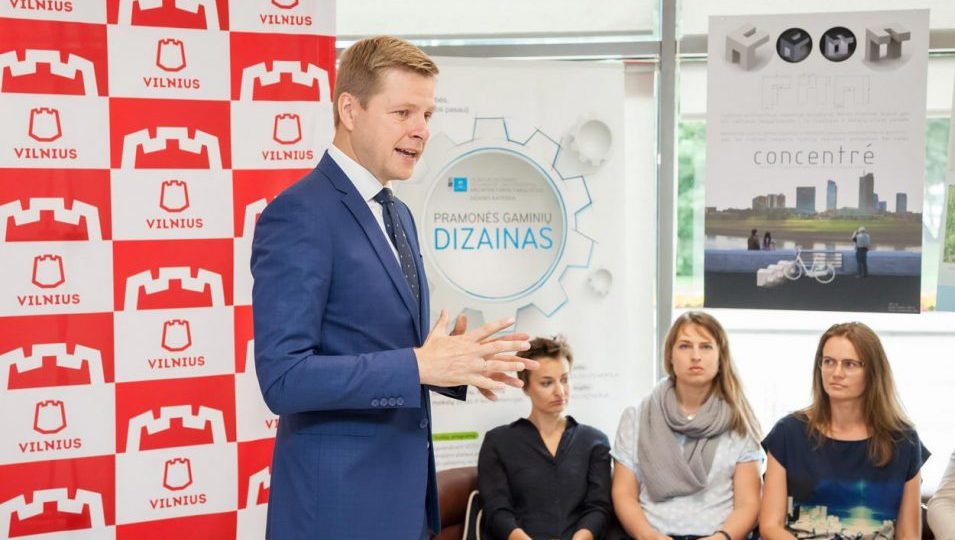Remigijus Šimašius: former Minister of Justice of Lithuania and member of the Seimas, now working as the mayor of Vilnius and admiring the Internet with his vigor. Have you heard of this one?
Today I am talking to him exactly - Remigius Šimašius!
He will tell:
- What advice would you give to people from Debes who are looking for a specialty?
- How do you become a politician and mayor of Vilnius?
- What simple method would make Lithuania a better place to live?
- How to respond to negative opinions of other people?
- What do you learn from being the mayor of a big city?
...And this and that more. Yes - I've just given away what you'll find in this chat, so let's get started shall we? 😉

You have to communicate with an infinite number of different people. Which people are the easiest to communicate with?
It is easiest to communicate with those who are brave. Who do not need to be pulled by the tongue, who can express their own opinions and suggestions and have a positive outlook on life. And anyway, in life I like people who look for solutions, not problems.
There are people who see a solution in every problem and there are people who see a problem in every solution - it is natural that it is more pleasant to communicate with people who see solutions everywhere. Then the communication results are better, which is also important.
Can you give advice to current students on how to choose a major and not make a mistake? How to discover your vocation?
My recommendation in this case would be the only one:
Try to distance yourself from the influence of other people and delve into what you really like the most.
On the one hand, this may sound like very simple advice, but it is not. If you would shake yourself so well and find out what and why you think, it may appear that one or another thing is really liked, but in fact it is just an image imposed by society or a stamp set by parents, the opinion of friends, imagining that it will be more or less profitable, easier or harder...
...And you really need to try to feel what you want.
And if you like many things - for example, both history and biology?
This is already the problem *laughs*. When you like one thing, everything is very clear. And when you like everything, you need to dig deeper - is it the desire to meet the standard that is imposed by society, or is it a real choice.
If you dig deep enough, you will still find that you like certain things more. Here is the crux of the matter.
What will happen after that? It will still be good, but it is important that the beginning is something that you like.
Later on, things may change a bit - you may start liking other things or there will be opportunities in other areas.
Imagine the situation - only after graduation, a person has a very clear plan for the future, including a specific company where he would like to work. However, what would you not advise to do so that you don't have to regret it later?
I would not advise you to go beyond moral standards, no matter what your plans are. But I think there's actually a lot of work to be done and a lot to do. And it is natural that the most favorite job or the most favorite career does not really start with high earnings, high positions, or very high appreciation.
It all starts with what you would like to get in terms of experience, from checking.
Therefore, it is quite logical to think that a lot should be done in order to do something in that area and to catch that dream of yours. And less to think that maybe you don't like something, maybe it's impossible.
A follower of Debesila has decided to follow in your footsteps and become a politician. What advice would you give him? What steps should be taken? What would be most important?
I have a specific approach to politics - some people think that politics is a specialty. I don't think so. Politics is a form of social expression. A person who goes into politics must be inclined to public representation, expression, and defense of ideas.
You need to answer the following question to yourself - if the teacher presents a certain decision without discussing it with the class, and everyone stays silent for fear of contradicting him - will you be the person who will stand up and say - no, we think differently, or I think it should be done differently - don't you dare?
So it is important not to be afraid, to do, to show initiative and maybe that path will lead to politics. At least that's what happened to me.
And if you are not that person, but you want to be, now is the best moment - go and do it. If you want to be a politician, you have to start speaking out now. Of course, it's never too late, but sooner is better.
To take the initiative to create something, to give suggestions on how it could be better, not to be afraid to object if something is not being done quite right.
How long ago did you turn to politics and why?
Looking at when to count the moment when I found myself in politics. If it was 1998 since I participated in the elections for the first time. Then I participated in the Vilnius City Council elections. Until then, I participated in the activities of the Liberal Party and the Liberal Youth Organization.
I was already interested in those ideas before, I read a lot. And I think people should have the freedom to express themselves. It gets very unsettling when someone starts getting on other people's heads, including myself.
You want to live a life that is the normal life of a successful person. And since my personality traits are apparently like this - if not me, then someone else - that's why I ended up in politics. First there were books, and then there were political activities.
What books have had the greatest influence on you?
"Slavery" by Friedrich von Hayek, published in 1990. It is a classic, known for many, many years.
You are registered in some social networks such as Facebook, Instagram, Google+ - what do they give you?
The downside of social networks is that there is no clear boundary between personal and social space. In the end, I came to the conclusion that it would not be possible to communicate in a friendly manner and at the same time be an official person. Google+ has solved this problem in the past, Facebook now has solutions too.
And for me, as a politician, it is natural that social networks are also a tool for political activity. It is a way to communicate with people and express your thoughts. And yet, social networks are not a means of communicating with friends for me. I use them as a public person and it is a great communication tool.
As an officer, you get enough feedback, both positive and critical. How do you respond to them?
I say "thank you" to the positive ones, I don't throw lightning bolts at negative reviews. After all, they are also negative for different reasons.
If there is a problem, it needs to be addressed.
And if a person is naturally angry, you need to see if it is due to a real problem or for other reasons. Of course, if kindness were a stronger emotion than anger, people who came to rallies would hand out bread to all the passers-by.
What benefits would you get if more people in the city participated in the activities of local communities?
The people who live in that place know the performance and problems best. The essential thing - if people are active, the municipality must help them and I consciously encourage it.
It is for people who show initiative that more concrete results could be achieved when communicating with the municipality.
Let's say there are two yards. And those yards of apartment buildings are not very tidy. In one of them, people gathered and said "We have already done something, we will organize some more ourselves, but we would like the municipality to help us do something else.". The residents of the next yard are simply asking for help.
…Naturally, we will first help those who put effort into managing their environment and have a concrete plan of what they can do themselves and how we can help them.
As in the municipality, so in the public sector - many results are not due to a lack of knowledge, but because desire achieve a result absence
What kind of city do you see in the future?
A growing, international, cosmopolitan city with good paying jobs. We need more international companies, more movement, more travelers, more people coming here for business or leisure.
Thank you for conversation, Remixed!
So, the mayor of the capital is not such a mystical being as it might appear to an ordinary pig. Cry. He, like many socially responsible and active citizens of Lithuania (of whom there is no shortage of readers of this blog), wishes good for Lithuania, encouraging everyone to contribute with their ideas, determination and work.
It is also fascinating that Remigijus Šimašius suggests seeing the problems, but not just talking about them, and take action to move them from the point of death.
...And I also wish not to be afraid to try and look for answers within myself first! I believe we are not the first to tell you this. Or not?
your friend
Pig Antanas
P.S The cloud girl helped the piglet to write Dalia Sipavičiūtė, conducting public speaking and senior management training and auditions. You know, it's hard to hit the letters on the keyboard with your hooves!
